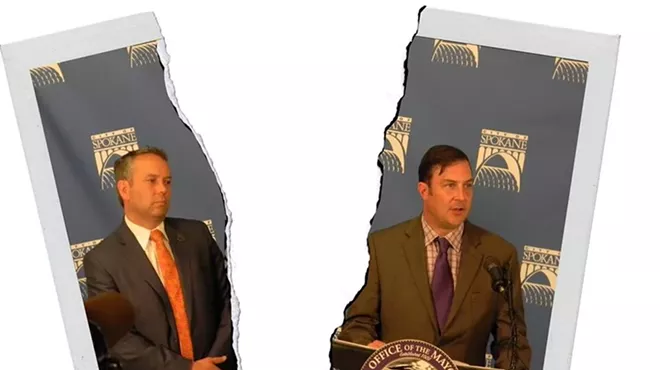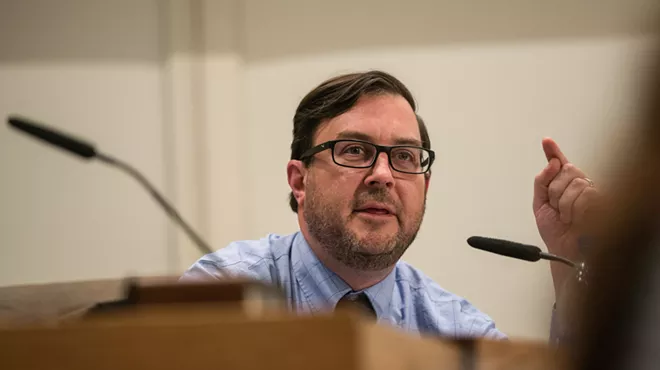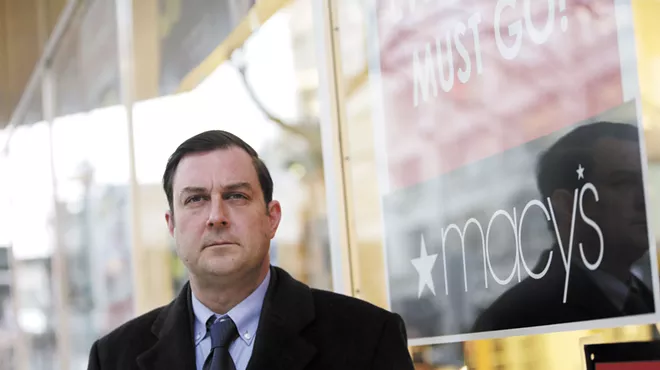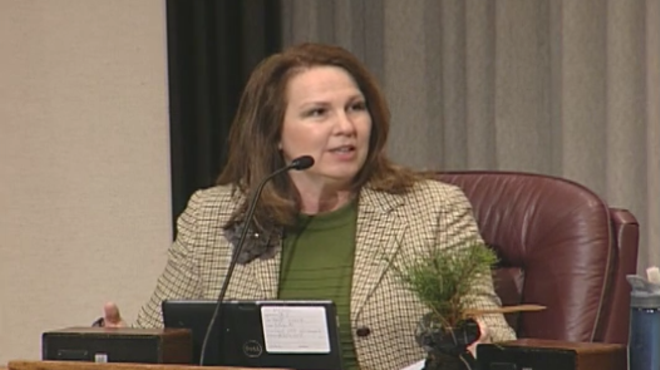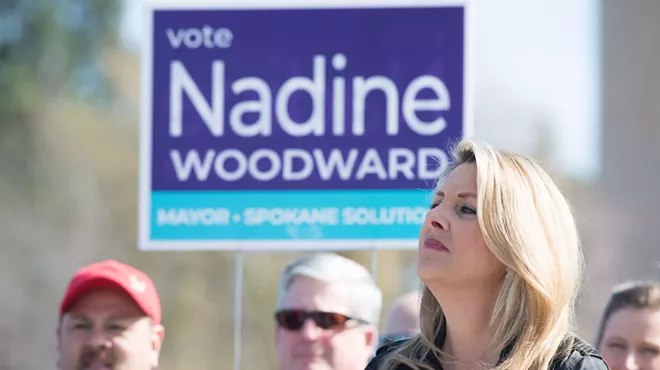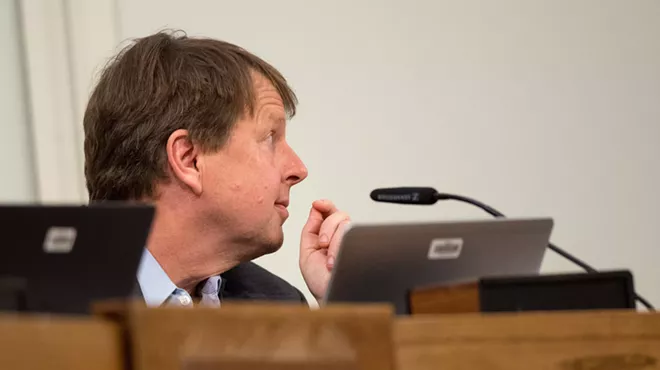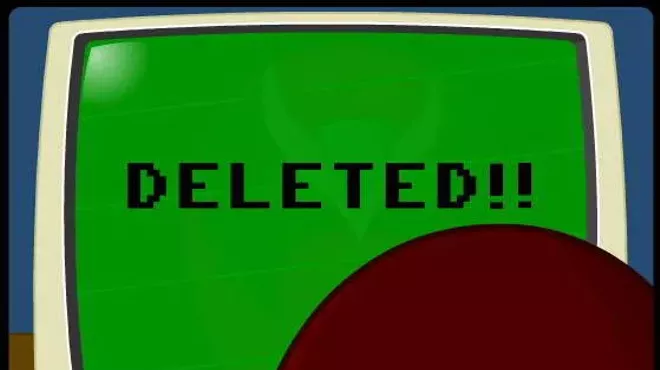
If you want to paint council president and mayoral candidate Ben Stuckart as brash or aggressive or direct — or even a jerk — there's a lot you can point to.
You can point to the times he accused the mayor and the city administrator of being liars, the public works director of treating employees "like shit" or the fire chief of "singing out of both sides of his mouth." You can point to the times he was publicly accused of being a "toxic bully" by a city attorney candidate or when city staffers told an independent investigator that he'd make "belittling" or "dismissive" comments like "that's stupid."
And so when former KXLY anchor Nadine Woodward launched her mayoral campaign in April, she pointed to the "bickering and charges of employee bullying" that pervaded City Hall. She's repeatedly called on the City Council and the Mayor's Office to "grow up" and move past their conflicts.
"What is the use of a good idea that you're so caught up in fighting or you're so abrasive that you can't build the consensus to make it happen?" Woodward asked.
But Stuckart isn't the only candidate who's been accused of toxic behavior. While Woodward's public image exudes warmth infused with authority, several former colleagues say that working with Woodward was so miserable it made them feel physically ill.
One former KXLY producer, Anna Izenman, described regularly becoming nauseous as all the "stress and anger" that she felt working with Woodward pooled into the bottom of her stomach. Another, Camille Troxel, tweeted earlier this year that the environment Woodward created was so hostile that she "threw up before going to work almost every day."
And just last month, Woodward's former campaign manager, Abra Belke, claimed that working for Woodward triggered both "hourly nightmares" and a "churning ulcer."
Both Woodward and Stuckart, of course, can each point to numerous people who loved working with each of them. But becoming mayor means charging into a battleground of divided departments, entrenched bureaucracies and stubborn council members. It's a city of 2,000 employees, far more than any of the five mayoral candidates have ever managed. And it takes mistreating just one to spark a lawsuit that can cost the city millions.
MORE, AT 11
"Working with Nadine was hands down one of the most stressful things I have ever done," Izenman says. "It's been five years and I still feel sick to my stomach."
In 2013, Izenman was producing the 11 pm newscast on KXLY with Nadine Woodward. As producer, she cut together footage and wrote the teleprompter scripts that Woodward would read on air.
Generally, Izenman says, Woodward wouldn't raise any concerns before the show. It was only after the show would finish, she claims, that Woodward would unleash a barrage of complaints on her way out the door, berating Izenman for everything she thought went wrong.
"If she didn't get her way, she would raise hell," Izenman says.
Woodward wasn't Izenman's boss, but the power difference was huge. Izenman was a 26-year-old working her first producer job. Woodward had two decades of experience and her face on billboards. And she was more than willing to play hardball when she felt treated unfairly: When contract talks broke down and Woodward was terminated from her former job at KREM, she sued KREM for age and gender descrimination.
Izenman acknowledges that the pace of the news environment could overwhelm her at times — but when she was booted from her role as a producer, she blamed Woodward. Izenman says Woodward complained to their bosses instead of sitting down with her to work out their issues.
"Maybe I was just incredibly lucky that everyone else I've worked with has been miles better," Izenman says.
Izenman showed the Inlander a Twitter direct message from March in which KXLY Executive News Director Melissa Luck referenced the conflict.
"I remember the issues you two had and I think she treated you unfairly," Luck wrote. "You weren't the only one."
Camille Troxel, who took over producing the 11 pm newscast in 2014, says that, at first, she thought maybe it was Izenman's fault she didn't get along with Woodward.
"Then it happened to me," Troxel says. While scrambling to prepare a report on the Sleepy Hollow wildfire in the summer of 2015, an argument between the two of them escalated.
"At that point, she just stood up and started yelling about how I didn't care about the show," Troxel says. "I'd never seen anyone in the newsroom behave that way. It felt so personal. Imagine having your hero yelling and shouting at you in front of all your peers."
When the show started, Troxel claims, Woodward refused to acknowledge Troxel's audio cues over her headset and lashed out at one of the other reporters during the show.
"As soon as the show was over, she stormed off the desk and stormed out of the newsroom," Troxel says. "I knew what had happened was really bad, when [meteorologist] Kris Crocker came back to the booth to apologize to me for what had happened."
Within a week, Troxel says, she and Woodward were called into a mediation meeting that included two of their bosses and KXLY's HR director. Troxel says that when she told Woodward that sometimes it didn't feel like she was a team player, Woodward responded with how-dare-you outrage.
"That's when she stood up and threatened to leave," Troxel says.
Troxel says she started taking anti-anxiety medication, increasingly worried her job was in jeopardy. After learning that Woodward had been keeping a list of Troxel's script mistakes and had brought them to management, Troxel says she went to HR, complained Woodward was subjecting her to a "hostile work environment," and then left KXLY soon after.
Back in June, the Inlander asked Woodward if she'd ever been accused of creating a hostile work environment. Woodward scoffed, accusing the Inlander of going on a fishing expedition. She did not recall conflict with Izenman, but did acknowledge a few challenges with Troxel.
"We had some struggles," Woodward says. "We didn't agree on everything."
As with any employee conflict, it's hard to apportion blame. Troxel acknowledges that she's sometimes rubbed other co-workers the wrong way since leaving KXLY.
"I've learned that I'm very direct and it doesn't always sit well with people," Troxel says.
Woodward encouraged the Inlander to ask KXLY about Troxel and speak to the many people who loved working with Woodward.
KXLY management, including Luck, wouldn't comment on personnel issues. One former KXLY producer, Joseph Suttner, however, told the Inlander he's had "nothing but positive things to say about" Woodward. She "has an incredible amount of experience and credibility," and that "she's a really good person and cares deeply about her job."
Woodward, meanwhile, herself has faced challenges since leaving KXLY and launching her mayoral campaign. Her campaign has churned through at least two political consultants and two campaign managers.
Abra Belke had been a veteran of high-pressure situations — she once lobbied for the NRA and competed on Who Wants to Be a Millionaire? — but lasted less than two months on Woodward's campaign. Belke declined to talk with the Inlander, but in a blog post, she'd described herself as wrestling with nightmares, ulcers and a moral dilemma as she saw her advice "falling on deaf ears."
"If your work is costing you your mental health and putting you in a position where you are asked to act contrary to your values, should you keep going?" she asked herself in the post.
Eventually, Belke concluded, "I didn't want my talents backing someone I now felt uncomfortable supporting."
Belke resigned at 3 pm on June 27, the same day an Inlander article revealed Woodward had expressed openness to banning homeless people from the library.
"In addition to my recent health setbacks, I am leaving the campaign because I no longer fully support the campaign and the candidate's tactics," Belke wrote to Woodward and the campaign, according to her resignation email. "She deserves someone who embraces her vision completely, and I am not that person."
Last week, the Inlander made multiple requests for a phone or in-person followup interview with Woodward. Instead, Woodward emailed a statement stressing that she performed her job to the best of her ability and expected her co-workers to do the same. She stressed that former KREM anchors Charles Rowe and Randy Shaw could vouch for her professionalism and dedication to mentoring younger colleagues.
Shaw tells the Inlander that he "never saw any conflict" between Woodward and her co-workers, that he believes "she'd make a wonderful mayor," and that "journalistically, it's a cheap shot" to air "somebody's sour grapes."
Woodward, meanwhile, believes that Stuckart's record of conflict is extremely relevant.
"As mayor, city employees can count on me to collaborate and unify through listening, engagement and treating people with respect," Woodward writes, "while Ben's bullying tactics have caused the city to lose exceptionally talented employees and sparked a $25,000 investigation over allegations of harassment by city staff."
BEN THE BULLY?
The independent investigation Woodward refers to was a fact-finding report into whether the behavior from four different council members, including Stuckart, violated the city's anti-bullying policy. None of the employees, the investigator found, had actually claimed there had been bullying.
While Stuckart wasn't a part of the inciting incident, the employees raised concerns about "snarky" and disrespectful behavior from the council president. At a 2017 budget meeting, the report found, Stuckart "exploded" in frustration at a department director, slammed his budget binder shut and "stormed" out of the meeting. Stuckart says that he'd received incorrect information three weeks in a row and fled the meeting to avoid losing his temper.
It wasn't the first concern that had been raised. One of the other council members scrutinized in the investigation, Kate Burke, had also clashed with Stuckart. After one tense exchange at a council meeting last year, Burke asked HR whether Stuckart's comments constituted bullying. HR concluded they hadn't.
And then there was the incident in 2016, when city attorney candidate Laura McAloon was seeking to be appointed as city attorney amid the lengthy fallout from the ouster of former Police Chief Frank Straub. She'd been one of the mayor's appointees on the joint committee overseeing the investigation into the city's handling of the Straub situation.
But when McAloon met with Stuckart, she said, the meeting ended with Stuckart standing up and walking out of the room.
"It was a toxic meeting," McAloon told the Inlander then. "I don't do bullies. I don't work with bullies."
She said Stuckart believed in "conflict for the sake of conflict." In a letter explaining her decision to withdraw from the position, she wrote that he'd subjected her to "unbridled hostility and animosity" and suggested that "personal ego and political aspirations" were outweighing Stuckart's duty to his constituents.
"I'm a very direct person," Stuckart says. "Some people are uncomfortable with my directness, and they take my assertiveness as aggressiveness. And that rubs some people the wrong way."
Stuckart says he sometimes raises his voice in committee meetings when he feels powerless to stop something. But as mayor, he argues, he'll have more direct influence over staff and won't need to rely on rhetoric. Give him a bigger stick, he argues, and maybe he won't feel the need to speak quite so loudly.
Like Woodward, Stuckart provides a list of old colleagues who sing his praises. Don Crouch, who worked for Stuckart for eight years at TicketsWest, says he was an incredible boss.
"He always kept his cool," Crouch says. "He was always the calming voice of reason."
But no boss is loved by everyone, Stuckart acknowledges. Good managers, Stuckart writes in response to Woodward's statement, make mistakes and learn from them.
"This process takes time," he writes. "It's simply something you do not learn by reading a teleprompter for 20 years or taking a couple of police ride-alongs during a political campaign."
APOLOGY TOUR
In the last two years, Stuckart has sought to rebuild some of his burned bridges. A few years ago, McAloon says, Stuckart told her he owed her an apology.
"I said, 'Yes, you do,'" McAloon recalls.
Based on his apology and conduct since their disagreement, McAloon says she doesn't have concerns about working with Stuckart going forward.
"We're all humans," McAloon says. "We're all going to be jerks at some point in time. The key is whether you own it and apologize for it."
"I'm sure I could be a softer person," Stuckart says. "I've worked on that. I've tried to be a lot more polite in committee meetings."
All of the employees who complained about council civility, HR Director Chris Cavanaugh says, tell her that their interactions with council members have "improved 110 percent."
Last year, Stuckart and Burke met with Liz Moore, director of the nonprofit Peace and Justice Action League of Spokane, in an attempt to heal their rift.
"It was pretty painful," Burke says, though neither she nor Stuckart were willing to get more specific. Stuckart believes his tension with Burke has declined significantly over time, noting they're partnering on housing issues right now.
But political consequences remain. McAloon says that she feels bad for the volunteer with the Stuckart campaign who knocked on her door when her husband answered.
"He opened the door and said, 'No, no way,'" McAloon says of her husband. "I can move forward. There may be members of my family who are not going to be able to do that."
Burke, meanwhile, hasn't endorsed Stuckart for mayor, and Stuckart hasn't asked for her endorsement. On Friday, Burke declined an Inlander request to elaborate about her experience with Stuckart.
"I don't want to talk to you about it," Burke says in a text message. "Thanks."
As for Woodward's campaign? Belke planted a yard sign in front of her house for mayoral candidate Jonathan Bingle and donated $250 to his campaign.
"Do you know how weird it is to meet a political candidate with values?" Belke wrote on Facebook.
Initially, Izenman wasn't planning on talking about her personal experience with Woodward. But she says seeing how Woodward talked about issues like homelessness spurred her to speak out.
"I knew she had conservative leanings, but she's like Trump in high heels," Izenman says.
And Troxel says she initially felt powerless seeing Woodward run for mayor. In response, she volunteered doing data entry for Stuckart's campaign. Troxel knows that Stuckart has a reputation for clashing with people as well.
THE OTHER CANDIDATES
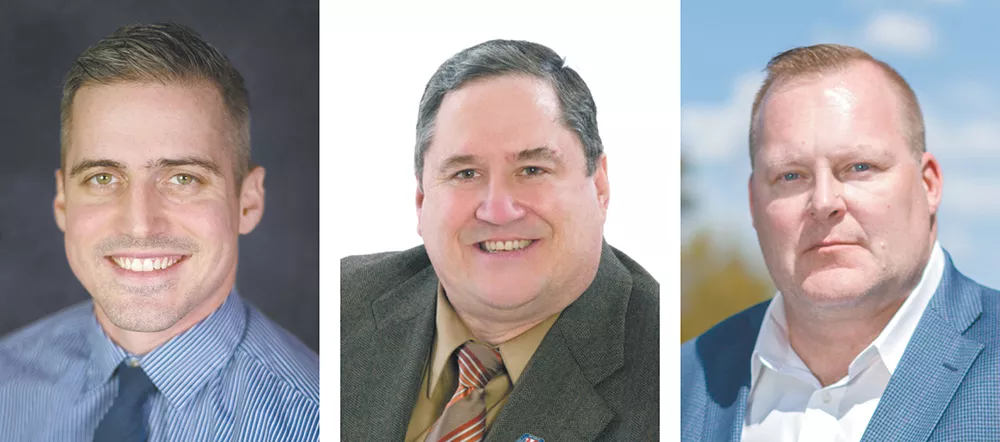
“As an Army colonel, that's what I did,” Poole says. Like Woodward, Poole champions an opposition to tax increases and a tough-love approach to addiction. Poole goes even further, however, arguing he’d be able to mandate 5-10 percent cuts across every department, and still pay for more downtown police officers.
JONATHAN BINGLE
It was prayer that convinced Jonathan Bingle to run for mayor, says the trivia company founder and former pastor. On one hand, Bingle wants more government accountability by, say, creating an office of an inspector general who can conduct independent investigations. “The citizens will get to know everything that will go on,” Bingle says.
On the other, he says he’ll fire anybody caught leaking confidential information to the media.
He suggests a 1 percent budget cut citywide to fund addiction services, but also argues some city-funded services shouldn’t be given to those “not interested in contributing to society.”
KELLY CRUZ
As a longtime neighborhood activist in the West Central area and the chair of the nonprofit Spokane COPS, Kelly Cruz has seen the intricacies of government from the sidewalk level. Cruz is worried about things like sex offenders being warehoused in West Central, property crime and drug addiction. He wants to cut some of the six-figure administrative salaries at City Hall and wants to bring back a youth advisory council.


